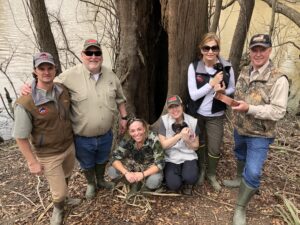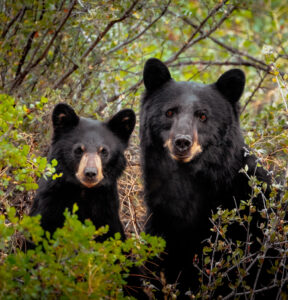SCI Foundation is a 501(c)(3) nonprofit organization that funds and directs worldwide programs dedicated to wildlife conservation and outdoor education. SCI Foundation ensures that the best available science is used in wildlife policy and management and demonstrates the constructive role that hunting and hunters play in the conservation of biodiversity around the world. The organization is First For Wildlife, investing millions of dollars into wildlife conservation and education every year.
The Conservation Department at SCI Foundation partners with academic institutions, community-based support organizations, and conservation non-governmental organizations to complete wildlife research and management projects all over the world. Since 2000, we have put over $70 million in hunter dollars to work on over 100 conservation projects in 30 countries. Some of our programs include:
- North America: SCI Foundation is a strong supporter of the North American Model of Wildlife Management and firmly believes that the hunter-conservationist is the key to future conservation efforts in North America. We have supported projects in 23 states and provinces involving a range of species. Recent foci have been on the interactions between hunted species and expanding predator populations, grizzly and black bear populations, and declining mule deer populations in the West and white-tailed deer in the upper Midwest.
- Africa: SCI Foundation has a long history of success in Africa. We work to support African states in managing their wildlife resources sustainably for the long-term benefit of their land, their people, and wildlife communities. We are currently supporting research to identify the most accurate and efficient methods to survey African lions and leopards so that these iconic species will continue to be conserved through sustainable use.
- Asia: Many central Asian countries are in the early stages of developing a sustainable use conservation model, but SCI Foundation has been present with our partners in the region since 2010. We support building capacity for local community-based conservation throughout the region, including projects in Kazakhstan, Pakistan, and Tajikistan.
- Antipoaching: Illegal harvest for meat or body parts is a primary threat to many wildlife species worldwide, especially rhinoceros and elephant in Africa. SCI Foundation has supported antipoaching efforts all over the world through grants, partnerships, and capacity-building efforts.
- Matching Grants: The SCI Foundation supports SCI Chapters in their efforts to contribute toward conservation projects in their local areas. If a Chapter supports a research or management project, they can apply for matching funds from the Foundation to increase their impact. In 2018, the Foundation contributed over $30,000 to local conservation efforts through matching grants to the chapters.
The annual African Wildlife Consultative Forum (AWCF) is SCI Foundation's premier activity in Africa, bringing together a diverse group of international stakeholders, senior government delegates, professional hunting associations, policy experts and wildlife biologists. Discussions at this forum center on African wildlife issues and coordinating responses to current events.
Project Updates
Africa
Asia
North America

Featured Articles
Recent Conservation Articles
SCI and Acadiana Chapter Continue Louisiana Black Bear Efforts
Safari Club International recently took one more step in its years-long advocacy efforts related to the Louisiana black bear. A subspecies of black bear, the Louisiana black bear was listed as a threatened species by the U.S. Fish and Wildlife Service (FWS) in 1992. By 2016, the bears had recovered and were
Read MoreSCI Joins Letter Supporting Recreational Shooting Ranges on Federal Lands
Last week, Safari Club International (SCI) joined 22 other hunting and conservation organizations, representing millions of sportsmen and women across the United States, in a letter to Interior Secretary Deb Haaland and Agriculture Secretary Thomas Vilsack. The letter outlines strong support for developing recreational shooting ranges on Bureau of Land
Read MoreConservation Spotlight: Predators in the Virginia Mountains
Recent studies in Virginia have taken a deeper dive than ever before into the habits, food preferences, and range of local predators. These were funded in part by SCI Foundation with matching grants from the local SCI Chapters (Mid-Atlantic Bowhunters, National Capital, and Washington Metro Chapters) and funding from the
Read MoreSCI Supports the Congressional Western Caucus: A Blueprint for Real Conservation
Recently, the Congressional Western Caucus, chaired by Representative Dan Newhouse and Senator Steve Daines, created the Western Conservation Principles in response to the Biden Administrations 30×30 initiative. The 30×30 initiative is the goal of conserving 30% of U.S. lands and waters by 2030 but unfortunately, the administration has still failed to even define conservation.
Read MoreSCI Conservation Project Highlight: Ocala-to-Osceola Wildlife Corridor
Safari Club International (SCI) North Florida Chapter recently made a generous donation to the North Florida Land Trust (NFLT) to assist with the Ocala-to-Osceola Wildlife Corridor initiative (O2O). The investment of the local chapter is a testament to SCI’s commitment to a sustainable hunting and conservation future. The O2O consists of 1.6
Read MoreThe Birth Of The International Wildlife Museum
What would become known as the SCI and SCIF International Wildlife Museum began with C.J. McElroy and Royal Bouschor, a Tucson attorney. The museum had no trouble gaining the support of the boards of directors of both SCI and SCICF early on. According to a 1979 issue of SAFARI Magazine,
Read More






